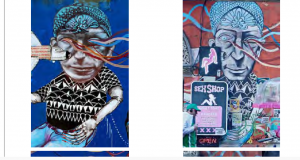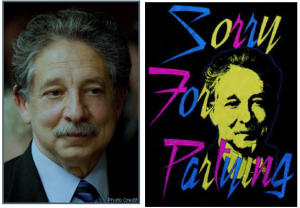Recurring events involving public art have underscored the tension between that expression and the law. Banksy’s “residence” in New York last fall broached this subject, but this summer’s Brooklyn Bridge flag incident, and several new lawsuits asserting copyright in graffiti will test the bounds of what the law protects and what it permits. As Banksy says in one of his murals, "graffiti is a crime."
Graffiti, Vandalism, and Public Expression: Public Art and its Uneasy Relationship with the Law
Topics: Burrow-Giles Lithographic Co. v. Sarony, Ahol Sniffs Glue, David Anasagasti, Steel, City as Canvas, Moral Rights, Argentina, Public Art, Graffiti Art, Philippa Loengard, Visual Artists Rights Act of 1990, Leonardo’s Last Supper, Columbia Law School’s Kernochan Center for Law Med, Chicago, Museum of the City of New York, VARA, Public Expression, Michael Bloomberg, American Eagle, Terry Gilliam, Banksy, 17 U.S.C. § 106A, Copyright, Buenos Aires, 5Pointz, Revok, Roberto Cavalli, vandalism, Reyes, Graffiti, The Atlantic, New York
Less Fun Than a Barrel Full of Monkeys (As a Matter of Law): The U.S. Copyright Office and the “Monkey Selfie”
There has much much Internet mirth about the recent publication of the Third Edition of the Compendium of U.S. Copyright Office Practices, more specifically, the Compendium’s statement that “the Office will refuse to register a claim if it determines that a human being did not create the work.”
Topics: Donn Zaretsky, Third Edition of the Compendium of U.S. Copyright, monkey selfie, Internet, crested black macaque, Lawrence Robbins, David Slater, Copyright, Trending Trademarks, Art Law Report
Have Some Foie Gras with Your Ethanol: Auction Houses Urge Ninth Circuit Not to Rehear California Resale Royalties Act Argument
The defendants in the case on appeal over the constitutionality of California’s Resale Royalty Act have just briefed the court’s question about whether the full court should rehear the case. Responding to an order that the parties explain whether the case conflicts with recent Ninth Circuit precedent, Christie’s, Sotheby’s, and eBay all argued emphatically that no conflict justifies reinstating the law that a District Court struck down in 2012.
Topics: Legislation, Foie Gras, Resale Royalties, 538 U.S. 644, N. Randy Smith, 729 F.3d 937, Auction Houses, California Health & Safety Code § 25982, Chuck Close, 730 F.3d 1070, Moral Rights, Commerce Clause, Affordable Care Act, Innocence of Muslims, Ass’n des Eleveurs de Canards et d’Oies du Quebec, Judge Jacqueline H. Nguyen, Christie's, Research & Mfrs. of Am. v. Walsh, California Resale Royalties Act, Ethanol, Dormant Commerce Clause, 491 U.S. 324, U.S. Constitution, Copyright, royalties, Garcia, Ninth Circuit, Cal. Code Regs. tit. 17 §§ 95480–90, Sotheby's, Rocky Mountain Farmers Union v. Corey, Healy v. Beer Inst., Ferdinand F. Fernandez, eBay, Google, Low Carbon Fuel Standard, Mary H. Murguia
Bad Sequel? Second Claim is Filed Asserting Another Actor’s Copyright in “Innocence of Muslims”
Like a bad 1980s movie, the most infamous copyright decicion of the year has now spawned a sequel. The Ninth Circuit Court of Appeals has been considering since early March whether to rehear en banc its decision in favor of Cindy Lee Garcia concerning her performance in the movie Innocence of Muslims. Plaintiff Cindy Lee Garcia, one of the actresses in the video, claimed that she had no idea what the movie was to turn out to be when she performed her scenes, and that the Islamophobic audio had been dubbed over whatever she actually said when filming. She then sued, arguing that her performance was an independently copyrightable work, such that the producers needed her permission to distribute and reproduce it. The complaint was universally disregarded by copyright experts when it was filed. This reaction was so nearly unanimous because Garcia’s performance (which, it was later learned, had been denied registration by the Copyright Office) seemed clearly to be a work for hire, or a joint work—if Garcia’s performance even met the other requirements for copyright.
Topics: registration, Innocence of Muslims, Gaylord Flynn, Mark Youssef, Copyright, Cindy Lee Garcia, Fair Use, Copyright Office, Google
Fair Use and Transformativeness Pushback: Seventh Circuit Takes a Swipe at “Lazy Appropriators”
Much ink has been spilled over the new world order seemingly announced by last year’s Second Circuit decision in Prince v. Cariou with regard to copyright, fair use, appropriation art, and “transformativeness.” In a nutshell, while roundly criticized, most commentators have taken the Prince decision to announce the apotheosis of “transformativeness” among the fair use factors in § 107 of the Copyright Act. Prince looked at the four statutory factors and applied them in such a way that to be considered “transformative” was to qualify for fair use. Most troubling was the “know it when you see it” character of the opinion. The Google Books opinions took a similar view.
Topics: Richard Prince, Cheshire Cat, Copyright Act, 17 U.S.C. §106, Seventh Circuit, Prince v. Cariou, Mifflin Street Block Party, Google Books, Campbell v. Acuff Rose, Wisconsin, Sorry for partying, Madison, Copyright, Kienitz v. Sconnie Nation LLC, Judge Frank Easterbrook, First Amendment, transformativeness, Fair Use, mayor Paul Soglin, 17 U.S.C. §107
The Art Law Report Turns Three: the Training Wheels are Off
As I have before, I wanted to mark the third anniversary of this blog since we posted three articles on September 15, 2011. In the last year, you (the reader) have helped the Report grow beyond our most optimistic hopes. We have done our best to cover significant events like the Gurlitt saga and restitution issues, the Detroit bankruptcy and the Detroit Institute of Arts, the Corcoran Gallery merger, auction houses and privacy in New York, the Beastie Boys GoldieBlox and copyright/fair use, the “flea market Renoir” case, and so much more. Our monthly traffic in year three has almost surpassed the readers in all of year one, and the sky is the limit. As always, the goal remains to present a fresh perspecive on these legal issues affecting the visual arts and its institutions, of use and interest both to the lawyer and non-lawyer alike.
Topics: Deaccession, Gurlitt Collection, Cy Pres, the Art Law Report, Gurlitt, Restitution, GoldieBlox, Copyright, Detroit Instiute of Arts, Corcoran Gallery, Beastie Boys, Detroit Bankruptcy, Fair Use
Just Kidding? Celebrity Hacked Photograph Exhibition Scuttled
Having presumably gotten all of us to take the bait, appropriation artist XVALA has backed off and announced that he will not include versions of hacked photographs of Jennifer Lawrence, Kate Upton, and others, in a show entitled “No Delete.” The show will instead include, apparently, “the artist’s self-shot, life-size, nude images.” So, there’s that.
Topics: The Showroom, reddit, No Delete, Jennifer Lawrence, Florida, Jeff Hamilton, Kate Upton, Cory Allen Contemporary Art, photo hack, XVALA, Copyright, Fair Use, Warehouse Arts District
Registration Open for 2015 National Cultural Heritage Law Moot Court Competition at DePaul Center for Art, Museum & Cultural Heritage Law
For students following the various issues we cover here, there is an exciting opportunity next winter. Registration is now open for DePaul University College of Law’s 2015 National Cultural Heritage Law Moot Court Competition in Chicago on February 27-28, 2015. The competition is open to twenty-six two- and three-member student teams from ABA-accredited or provisionally accredited law schools. Schools may register up to two teams.
Topics: National Cultural Heritage Law Moot Court Competit, Moral Rights, Visual Artists Rights Act of 1990, VARA, Morag Kersel, 17 U.S.C. § 106A, Copyright, Lubna El-Gendi, First Amendment, Depaul Center for Art Museum & Cultural Herita, Patty Gerstenblith, Fifth Amendment
Can Copyright Aid Kate Upton, Jennifer Lawrence, and Other Victims of Celebrity Photo Hack?
As anyone with a computer now knows, the story broke last week of a supposed cache of hundreds of intimate photographs of numerous celebrities, including Kate Upton and Jennifer Lawrence, and Detroit Tigers pitcher Justin Verlander. Over the course of the week, rumors circulated about who, exactly, had them, and whether or where they would be leaked online. The story also raised important questions about privacy, security, and default cloud storage of which many people were simply unaware.
Topics: The Showroom, Richard Prince, U.S. Copyright Office, reddit, rights of publicity, Second Circuit, No Delete, Canal Zone, Jennifer Lawrence, Patrick Cariou, Florida, Detroit Tigers, Yes Rasta, Saint Petersburg, Jeff Hamilton, Kate Upton, Cory Allen Contemporary Art, selfie, photo hack, Justin Verlander, XVALA, Copyright, First Amendment, Fair Use, Warehouse Arts District, Art Law Report
“Dumb Starbucks” Epilogue: Comedy Central Airs “Nathan For You” Episode Behind it All, Explores Parody, Commerce, and Visual Art
Readers will recall the strange case of “Dumb Starbucks” earlier this year, which initially seemed to pose the question of whether a coffee shop that transparently used the marks and copyrights of Starbucks could claim fair use as an art gallery. It turned out that the entire performance was just that, a lead up to a Comedy Central series that has since debuted. We are not, of course, television critics, but in addition to being hillarious (and undoubtedly tongue in cheek), the full episode is an interesting platform for questions about the players and entities that can claim fair use to copyrights or trademarks over visual and creative works. In the end, the parody/fair use question could never really be answered, but the coverage the numerous news clips that the show included is a reminder of the difficulty of applying art critical concepts to legal analysis.
Topics: Comedy Central, parody, Nathan for You, Weird Al Yankovic, @dumbstarbucks, Nathan Fielder, Copyright, Starbucks, Twitter, Fair Use




